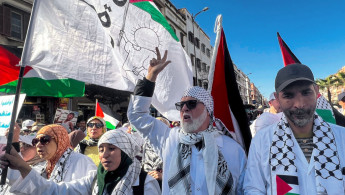Majority party urges Morocco's King to revoke Moroccan-Israelis of their citizenship 'over Gaza crimes'
In Morocco, a member of the Al-Istiqlal party - one of the three political parties in the coalition government - has called on the Moroccan king Mohammed VI to strip Israeli-Moroccans of their North African citizenship over "their contribution to war crimes."
"The so-called Israelis of Moroccan origin admit their affiliation to a criminal entity and their practices against humanity," wrote Malika El-Assimi, a Moroccan intellectual and member of the Nationalist party Al-Istiqlal in a letter directed to Morocco's king.
"Each of these elements could be a reason for stripping them of their Moroccan nationality, which does not allow its holder to commit criminal acts or belong to the armies of a foreign country," added El-Assimi in a letter published by BDS Morocco over the weekend.
El-Assimi, who is a renowned political figure in the North African kingdom, has also called on King Mohammed VI to cut all ties with Israel and revoke the normalisation accord signed in 2020.
Morocco was once the thriving heart of a large community of Jews estimated at a quarter a million.
Between 1940 and 1960, more than 300,000 Moroccan Jews immigrated to Israel.
While there's no official data on Israelis who hold Moroccan citizenship, Moroccan Jews and Jews of Moroccan ancestry make up around 1 million out of Israel's total population of 9.1 million in 2020.
In her letter, the Moroccan politician and former MP argues that Israel is a military entity in which there are "no civilians."
"The so-called civilians are reserve armies and a structural component of a purely military entity," she added in her letter.
Over the past few years, several Morocco-born officials rose to power in Tel Aviv, including two ministers in Netanyahu's far-right cabinet.
Aryé Makhlouf Dery, born in 1959 in the Moroccan city of Meknes, briefly occupied the position of Minister of the Interior and Health this year before the Supreme Court ruled that Deri was not eligible for a ministerial position due to his past criminal convictions (bribery and fraud).
For his part, Israeli Minister of Labour Yaakov Margi was born in the Moroccan capital city of Rabat in 1960 before immigrating in 1962 with his family to Israel.
The previous Israeli government led by Naftali Bennett, leader of the Yamina party, included four ministers of Moroccan origin, while Netanyahu's previous cabinet included ten ministers of Moroccan origin.
Since normalising ties with Rabat in 2020, Israeli politicians with Moroccan roots have played a vital role in the public diplomatic scene of the Rabat-Tel Aviv partnership, relying heavily on the Jewish Moroccan heritage asset and their fluency in the Moroccan Darija dialect.
After signing the normalisation deal on 22 December 2020, Meir Ben-Shabbat, the National Security Adviser of Israel, took the stage and spoke in the Moroccan dialect, saying, "Our Moroccan brothers, peace be upon you, and may God increase your goodness."
Ben-Shabbat, who has Moroccan roots, ended his speech with 'Lah Yabrek Fi Aamer Sidi', a Moroccan salute Moroccans use to express gratitude to their King.
Rabat has yet to comment on El-Assimi's letter to the Monarch.
Meanwhile, El-Assimi's party Al-Istiqlal, a nationalist party and part of the current government coalition, declined to comment when contacted by The New Arab.
In 2018, the Al-Istiqlal party submitted a draft law to the parliament to criminalise all forms of normalisation with Israel. But, since the normalisation accords, most of the political parties in Morocco, including Istiqlal, have avoided openly speaking on their position on ties with Israel.
Morocco and Israel are set to celebrate the third anniversary of their normalisation accord on 22 December.
On the same day, local pro-Palestine groups are planning a national rally in Rabat to reiterate their demand to cut all ties with Israel and close the Israeli liaison office in Rabat.





 Follow the Middle East's top stories in English at The New Arab on Google News
Follow the Middle East's top stories in English at The New Arab on Google News
![Both Hamas and the Palestinian Authority welcomed the ICC arrest warrants [Getty]](/sites/default/files/styles/image_330x185/public/2024-11/GettyImages-2178351173.jpg?h=199d8c1f&itok=TV858iVg)

